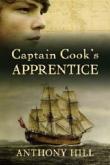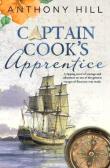
Latest Issues
AbstractHistoryArchive Description
'A fictional recreation of one of the greatest voyages of discovery ever made, by award-winning author Anthony Hill.
'The enthralling story of Captain Cook's voyage to Australia, as seen through the eager eyes of a cabin boy.
'When young Isaac Manley sailed on the Endeavour from England in 1768, no one on board knew if a mysterious southern continent existed in the vast Pacific Ocean. It would be a voyage full of uncertainties and terrors.
'During the course of the three-year journey, Isaac’s eyes are opened to all the brutal realities of life at sea – floggings, storms, press-gangs, the deaths of fellow crewmen, and violent clashes on distant shores.
'Yet Isaac also experiences the tropical beauty of Tahiti, where he becomes enchanted with a beautiful Tahitian girl. He sees the wonders of New Zealand, and he is there when the men of Endeavour first glimpse the east coast of Australia, anchor in Botany Bay, and run aground on the Great Barrier Reef.
'Acclaimed and award-winning historical novelist Anthony Hill brings to life this landmark voyage with warmth, insight and vivid detail in this exciting and enlightening tale of adventure and discovery. ' (Publication summary)
Publication Details of Only Known VersionEarliest 2 Known Versions of
Other Formats
- Also sound recording.
Works about this Work
-
'Why Does It Always Have to End like This?' : On Board the Endeavour in Australian Children’s Fiction
2019
single work
criticism
— Appears in: Journal of the European Association for Studies of Australia , vol. 10 no. 1 2019;'Journals of the earliest British visitors to Australian shores facilitated the creation of the image of Australian Indigenous nations as savage, primitive and inferior in every aspect of their appearance and their way of life to both Europeans and indigenous peoples of other lands. In 1688, William Dampier described the inhabitants of “New Holland” as “the miserablest people in the world … having no [sic] one graceful feature in their faces.” In 1770, James Cook found the natives’ canoes “the worst … [he] ever saw” (A New Voyage ch. 16). The encounter took a hostile turn when beads and nails thrown at their feet failed to impress Aboriginal people and pave the way for a peaceful landing. Prejudiced descriptions and opinions justified European colonisation of Australia and dispossession of indigenous peoples. It took more than two centuries to revise those views. Literature was a powerful tool of colonisation and in turn was used by the colonised to oppose the coloniser. In this article, literature is examined as a tool for adopting fresh perspectives in education of new generations of young people in Australia about Cook’s discoveries on the Endeavour journey. The paper examines two children’s novels—The Goat Who Sailed the World by Jackie French (2006) and Captain Cook’s Apprentice by Anthony Hill (2008)—in order to demonstrate that these novels can be extremely important in educational, cultural and socio-political terms because they open the ground for a discussion of ideologies, social behaviour and cultural values in classroom, and thereby can contribute to the ongoing process of reconciliation in Australia.'
Source: Abstract.
-
[Review] Captain Cook's Apprentice
2009
single work
review
— Appears in: Fiction Focus : New Titles for Teenagers , vol. 23 no. 1 2009; (p. 68-69)
— Review of Captain Cook's Apprentice 2008 single work novel -
[Review] Captain Cook's Apprentice
2009
single work
review
— Appears in: Fiction Focus : New Titles for Teenagers , vol. 23 no. 1 2009; (p. 32-33)
— Review of Captain Cook's Apprentice 2008 single work novel -
Living Historical Fiction
2009
single work
essay
— Appears in: Magpies : Talking About Books for Children , July vol. 24 no. 3 2009; (p. 12-13) Hill talks about the maxim he shares with novelist Patrick O'Brian, that 'authenticity is a jewel' when it comes to historical fiction. -
[Review] Captain Cook's Apprentice
2009
single work
review
— Appears in: InCite , June vol. 30 no. 6 2009; (p. 22)
— Review of Captain Cook's Apprentice 2008 single work novel
-
James Cook: Benign Explorer or Invader?
2008
single work
review
— Appears in: The Canberra Times , 4 October 2008; (p. 14-15)
— Review of Captain Cook's Apprentice 2008 single work novel ; Cook's Endeavour Journal : The Inside Story 2008 single work diary ; Sea of Dangers : Captain Cook and His Rivals 2008 single work biography -
[Review] Captain Cook's Apprentice
2008
single work
review
— Appears in: Viewpoint : On Books for Young Adults , Summer vol. 16 no. 4 2008; (p. 4)
— Review of Captain Cook's Apprentice 2008 single work novel In this substantial review Fran Knight maintains this 'historical novel full of adventure and high drama' is a 'model of all that is best' in the faction or bio fiction form. -
[Review] Captain Cook's Apprentice
2008
single work
review
— Appears in: Reading Time : The Journal of the Children's Book Council of Australia , November vol. 52 no. 4 2008; (p. 35)
— Review of Captain Cook's Apprentice 2008 single work novel -
[Review] Captain Cook's Apprentice
2009
single work
review
— Appears in: InCite , June vol. 30 no. 6 2009; (p. 22)
— Review of Captain Cook's Apprentice 2008 single work novel -
[Review] Captain Cook's Apprentice
2009
single work
review
— Appears in: Fiction Focus : New Titles for Teenagers , vol. 23 no. 1 2009; (p. 32-33)
— Review of Captain Cook's Apprentice 2008 single work novel -
Just the Spot for their Plots
2008
single work
column
— Appears in: The Canberra Times , 13 September 2008; (p. 4-5) -
Why Another Cook Book?
2008
single work
essay
— Appears in: Viewpoint : On Books for Young Adults , Summer vol. 16 no. 4 2008; (p. 2-3) Anthony Hill talks about the research for his latest title 'Captain Cook's Apprentice', which ranged from an eight day journey on the Endeavor replica to a visit to 'Grass Cove' in New Zealand where ten of Cook's men were killed and eaten during the second voyage. -
Living History - Writing History
2009
single work
column
— Appears in: ACTWrite , April vol. 15 no. 3 2009; (p. 4-5) -
Living Historical Fiction
2009
single work
essay
— Appears in: Magpies : Talking About Books for Children , July vol. 24 no. 3 2009; (p. 12-13) Hill talks about the maxim he shares with novelist Patrick O'Brian, that 'authenticity is a jewel' when it comes to historical fiction. -
'Why Does It Always Have to End like This?' : On Board the Endeavour in Australian Children’s Fiction
2019
single work
criticism
— Appears in: Journal of the European Association for Studies of Australia , vol. 10 no. 1 2019;'Journals of the earliest British visitors to Australian shores facilitated the creation of the image of Australian Indigenous nations as savage, primitive and inferior in every aspect of their appearance and their way of life to both Europeans and indigenous peoples of other lands. In 1688, William Dampier described the inhabitants of “New Holland” as “the miserablest people in the world … having no [sic] one graceful feature in their faces.” In 1770, James Cook found the natives’ canoes “the worst … [he] ever saw” (A New Voyage ch. 16). The encounter took a hostile turn when beads and nails thrown at their feet failed to impress Aboriginal people and pave the way for a peaceful landing. Prejudiced descriptions and opinions justified European colonisation of Australia and dispossession of indigenous peoples. It took more than two centuries to revise those views. Literature was a powerful tool of colonisation and in turn was used by the colonised to oppose the coloniser. In this article, literature is examined as a tool for adopting fresh perspectives in education of new generations of young people in Australia about Cook’s discoveries on the Endeavour journey. The paper examines two children’s novels—The Goat Who Sailed the World by Jackie French (2006) and Captain Cook’s Apprentice by Anthony Hill (2008)—in order to demonstrate that these novels can be extremely important in educational, cultural and socio-political terms because they open the ground for a discussion of ideologies, social behaviour and cultural values in classroom, and thereby can contribute to the ongoing process of reconciliation in Australia.'
Source: Abstract.
Awards
- At sea,
- 1768-1771





